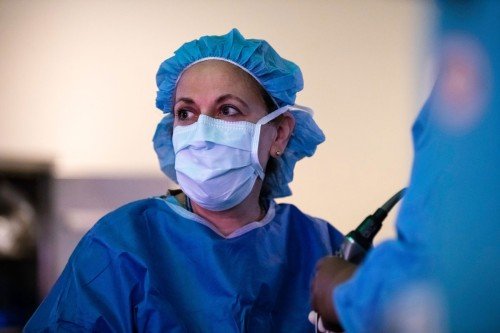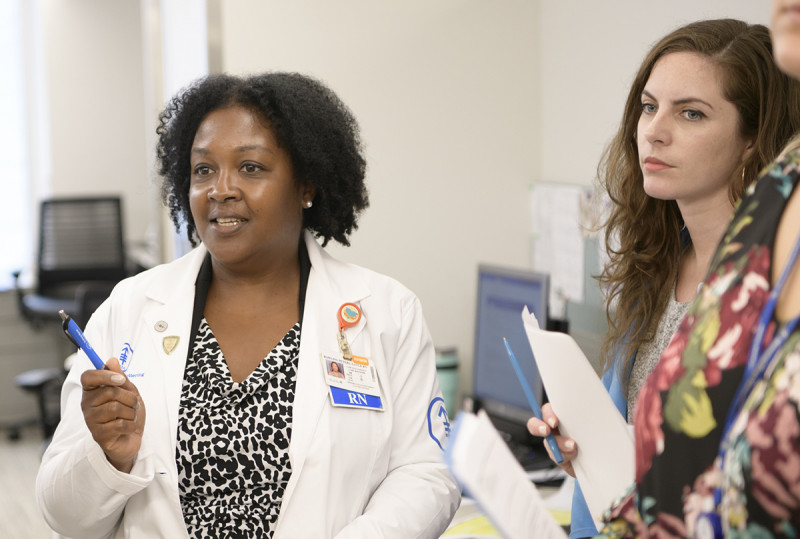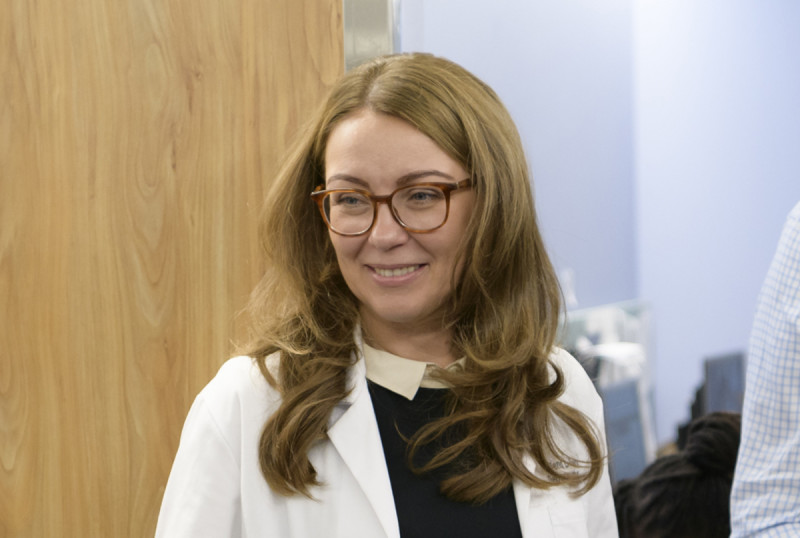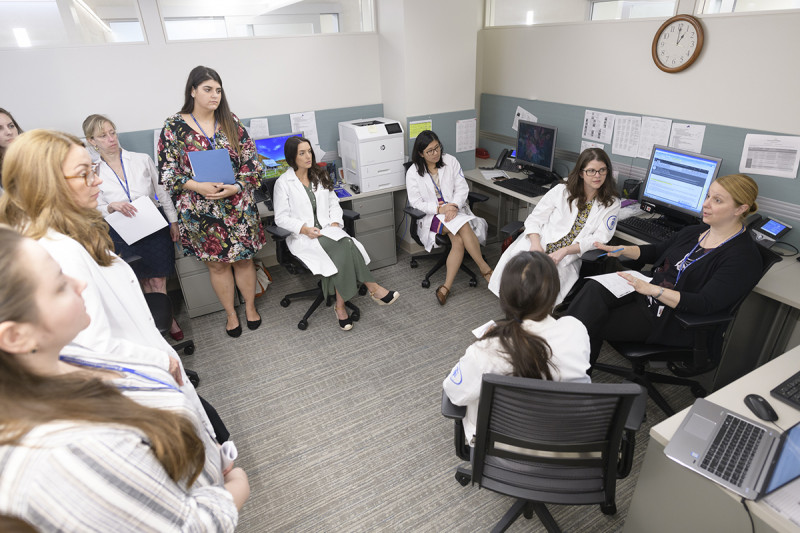More than a dozen Memorial Sloan Kettering specialists are shoulder to shoulder in an office nook, talking rapid fire. Minutes ago, they finished examining three patients at great length. But they aren’t just discussing their medical conditions or treatment options. They are dissecting everything from complex family dynamics to plans for physical rehabilitation, from financial worries to religious beliefs.
These experts are engaged in an exciting new model for delivering sophisticated cancer care. But the method they are following doesn’t come from the world of oncology. And it doesn’t rely on cutting-edge technology. Instead, it draws on commonsense ideas to help people with cancers of the brain — some of the most mysterious and terrifying of all diseases.
The MSK Neurology Multidisciplinary Care Clinic (MdCC) is thought to be the first such clinic for brain cancer in the United States. The basic premise turns conventional medical routine on its head. Instead of patients traveling from one appointment to another to see various specialists — often spread over days or weeks — the MdCC brings the experts to see each person on the same day in a single exam room.
The result is one-stop care for the patient, concentrated in a three-hour series of exams by neurologists, rehabilitation specialists, physical therapists, nurses, social workers, case managers, a nutritionist, and even a visit from a chaplain, who serves as a spiritual adviser and sounding board. Early feedback from patients who have participated is very promising.
Why Brain Cancer Is So Challenging
Any cancer diagnosis can be devastating, of course. But many people with brain cancer face unique challenges because the disease can threaten the very core of their identity. “Our patients have lesions in their brains, which can cause problems with speech and mobility, and they may face profound problems with memory and judgment,” says Elena Pentsova, co-founder of the MdCC and a neuro-oncologist.
These changes can be particularly harrowing for family and loved ones, says neurologist Lisa DeAngelis, MSK’s acting Physician-in-Chief. In some cases, she explains, “These cancers can affect parts of the brain that result in impulsivity and behavioral issues, even anger and aggression to family members, and the patients can’t help themselves. The symptoms of brain cancer can exhaust families and put them in crisis, even those with lots of resources to get help.”
Dr. Pentsova and her colleagues physiatrist Lisa Ruppert and anesthesiologist Kara Barnett wanted to find a treatment model to help. They were spurred on by their participation in the Junior Faculty Emerging Leaders Program, which MSK holds to cultivate new ideas. The trio found a promising answer outside cancer care, in the treatment of another much-feared disease, amyotrophic lateral sclerosis (ALS), also known as Lou Gehrig’s disease.
Like brain cancer, ALS can rob people of their ability to move and speak. In ALS, bringing specialists to visit the patient — instead of the other way around — has shown improved survival rates and quality of life and reduced hospital admissions. “We wanted to treat particularly fragile brain cancer patients with all the amazing resources MSK has to offer and to make sure they receive all the help we can give,” says Dr. Pentsova.
Improving Quality of Life for People with Brain Cancer
After studying the ALS model, Dr. Pentsova began MSK’s Neurology MdCC in August 2017, along with Dr. Ruppert, who specializes in rehabilitation for people with neurologic cancers. People with brain cancer who have been referred by MSK doctors and their family members and caregivers are invited to a three-hour session with MSK specialists who can address their unique needs.

During a recent clinic, the coordination between specialists was on full display. Everyone agreed that one patient needed physical therapy. But a social worker, after talking with the patient about family life, suggested an outpatient facility might be more productive than home visits. This insight was crucial to a good outcome, the others said.
Doctors felt another patient needed home care assistance. But the health insurance company was resistant. A case manager asked the team a series of penetrating questions. Within minutes, a plan was created to use a government healthcare program that was appropriate for the patient. Other specialists hadn’t known about this option.
Some of the most important care at the clinic revolves around the patients’ families, such as adult children who need help persuading a parent with memory loss to wear a medical alert necklace. Or a family with young children who worry about how much to reveal to their kids about a parent’s condition. Or a family who needs help expediting a medical necessity visa for a relative who lives overseas.
“MSK always treats the whole person. But to make those really deep connections it sometimes takes an hour and a half or two hours to create a safe space for a patient or family member to open up,” says Dr. DeAngelis. “And we usually just don’t have that kind of time in a regular clinic visit.”
Dr. Pentsova believes the personal touch helps the specialists too. “I’ve learned so much from talking face-to-face with experts in other fields, like about a food bank run here at MSK to help patients in financial need, which is a real problem for people with big medical bills. Until this clinic, I didn’t know about this resource,” she says.
A Strong Recommendation from People with Brain Cancer
The response from patients has been strongly positive. A survey of 45 of the clinic’s patients found that all of them would recommend the Neurology MdCC to others. “We learned about new treatments and other ideas we can use in our life. And seeing everyone in one visit is a plus,” said one patient.

Another patient encouraged others coping with brain cancer to “take it one day at a time. Things will change so don’t assume anything.” He praised the comprehensive plan each patient receives soon after their round of exams. This contains a concise, easy-to-understand action plan from each specialist, which may include everything from an appointment schedule for physical therapy to a prescription for a wheelchair, nutritional tips to assistance setting up home healthcare.
“It’s quite remarkable that it’s been successful so quickly,” says Dr. DeAngelis. “The patients I’ve sent to the clinic have really had a good experience. It’s made a big difference for them.”
In fact, the clinic has proven so successful that it is now open twice a month. And doctors treating other types of cancer have come to the clinic to see if the model might work for their patients too.
Dr. Pentsova says, “I like this model of meeting face-to-face because I feel we get a better sense of who are patients really are, they get a better sense of who we are, and we all learn from each other. That improves the connection for everyone.”















